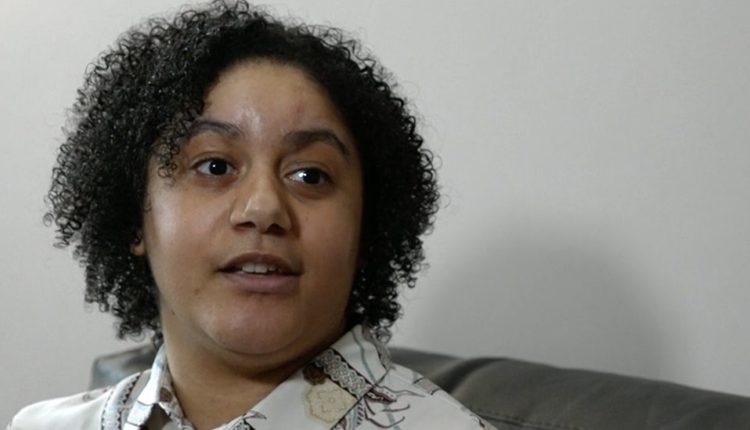Dr Jazmin Scarlett, a student in volcanology, had been excited to embark on a career in academic research. She believed she was well placed to get job offers given she has a distinction in her masters and is a recipient of the prestigious President’s medal from the Royal Geological Society.
But almost a year on from obtaining her PhD, Dr Scarlett has received more than 30 rejections for full-time research posts. After one unsuccessful application, Dr Scarlett asked for feedback, and was told that although she was academically qualified, it was felt she “would not fit in”.
She acknowledges that getting a job in academia isn’t easy, but suspects her race may be a factor.
“I feel almost paranoia that it is because of the colour of my skin. Because the feedback I constantly get has been: ‘Your CV is great, you are great in the interview, but there’s someone that’s got that little bit extra’ – and those people have been white.'”
She says that her peers who did PhDs around the same time as her and have taken the next step in their careers – as post doctoralresearchers – are all white.
Dr Scarlett says: “My credentials and my CV and experience for the position are great, but why is it that someone else has been hired instead of me?”
Many exceptionally gifted black science students choose not to get to even Dr Scarlett’s stage.
Jariatou Jarra wanted to research quantum mechanics when she started her physics degree at Imperial College London. After obtaining a First Class degree from one of the most prestigious scientific teaching institutions in the world, she decided to become a management consultant because she felt she did not belong.
“When you see that you don’t act the same, you don’t look the same, it becomes very hard to find yourself completely involved. And once you look at the (academic staff), you don’t see people that look like you in those positions where they would recommend you for a PhD, where they would support you. Because you don’t see that, it becomes hard to imagine what life would be like in that space”.
A Royal Society report, published earlier this year, shows that a greater proportion of black people are dropping out – at every stage of their scientific careers – than their white counterparts, whereas many other ethnic minority groups are better represented.
Drawing on data from the Higher Education Statistics Agency, the Royal Society produced the first comprehensive analysis of the ethnicity of students and staff in science, technology, engineering and maths subjects in the UK.
It found that 6.5% of black people who begin research drop out, compared with 3.8% white students. For those who remain in science, 3.5% are made professors – whereas it’s nearly 12% of their white counterparts who do. Overall, black people account for 1.7% of research staff – whereas they make up 3.4% of the UK population.
The president of the Royal Society, Prof Sir Adrian Smith, described the situation as “unacceptable”.
“Science is really important, and we have global challenges to meet. We need the very best talent and people to be involved and it is completely unacceptable that there are major groups that are not really involved at the moment.”
Prof Christopher Jackson, a geoscience professor at Manchester University, told BBC News that he believes that publicly funded academic research in the UK, conducted mostly in universities, is “definitely institutionally racist”.
He said the problem is compounded by the fact that senior white scientists don’t recognise there is racism in their institutions.
“They say, ‘there is no discrimination amongst us because we’re clever, progressive and liberal’. But racism and racists persist within those networks too. They persist because they are not engaging to give black people the support they need to navigate a system which is often quite alien to them and to tell you about some of the unspoken norms and hidden laws that are in there,” he explained.
According to Dr Mark Richards, an atmospheric researcher at Imperial College London, the data demonstrates that black students and early career scientists are not getting the backing they need from their professors.
“They seem to show that there is an element of racism or structural bias,” he told BBC News.
The racism, he says, is very rarely overt or intentionally offensive. Rather it manifests itself subtly, he says. Academic careers depend on senior professors liking certain individuals: taking them under their wing by giving them support, advice, and opening doors for them.
“People look for a younger version of themselves,” says Prof Richards. “If you are from an under-represented group, the likelihood of you being favoured is going to be reduced. While being liked is certainly a good quality, I don’t think it should be the determining factor. It should really be about the quality of your work and the merit of your efforts.”
Some black academics are concerned that the research funding system is also biased against them. Last year, 10 black women wrote an open letter to the UK Research and Innovation agency (UKRI), which is the body that allocates research grants. They wrote it after failing to get any of the £4.3 million funding for research into the reasons why black, Asian and other ethnic minority groups were harder hit by Covid infection than the white population.
Source: BBC


Comments are closed.